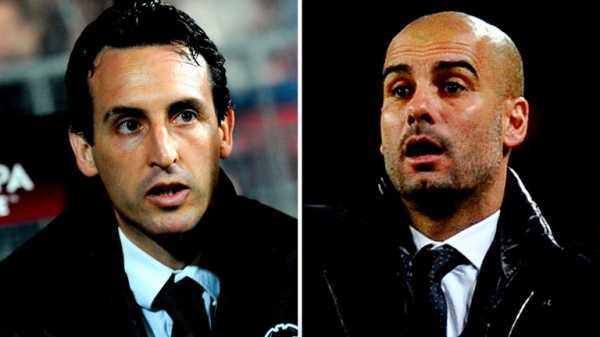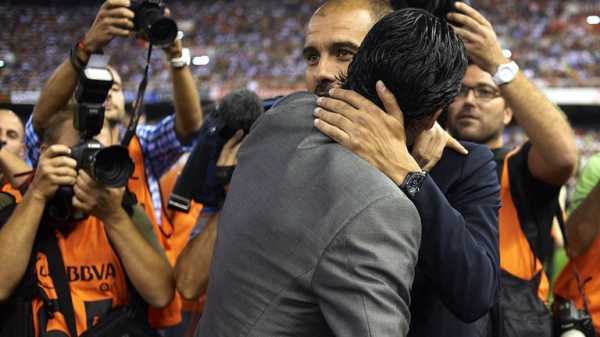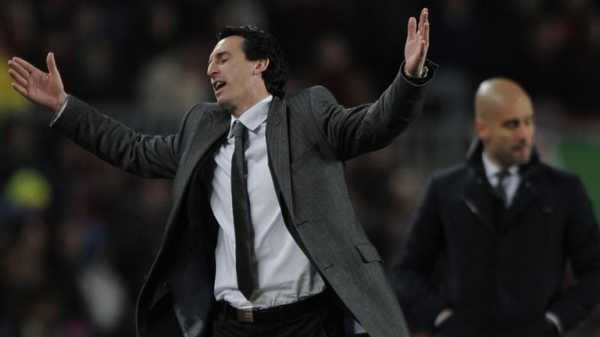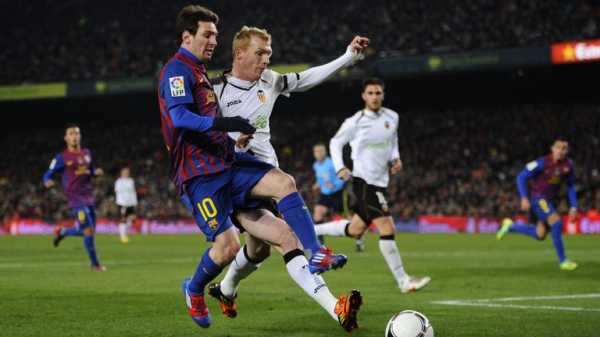
Manchester City are strong favourites against Arsenal on Super Sunday but Unai Emery’s history with Pep Guardiola suggests it could be closer than many expect. Nick Wright revisits their rivalry and finds out how Emery’s Valencia became a formidable foe for Guardiola’s Barcelona.
On the face of it, Unai Emery’s record against Pep Guardiola does not offer much hope to Arsenal supporters ahead of Sunday’s Premier League opener against Manchester City. The two men are familiar foes from their days in charge of Valencia and Barcelona between 2008 and 2012. But Emery did not win any of their 10 meetings.


Arsenal vs Man City
August 12, 2018, 3:30pm
Live on

Get Sky Sports Get a Sky Sports pass
It is just one of the reasons why City are so strongly fancied to make a winning start to their title defence at the Emirates Stadium. The work has only just begun for Arsenal under their new head coach, but City were irresistible last season and picked up where they left off against Chelsea on Sunday. Emery has never beaten Guardiola. Why should that change now?
It is certainly a daunting start, but Emery’s record of no wins, four draws and six losses against Guardiola is somewhat deceptive. In reality, he tested the Catalan like few other managers in La Liga. Barcelona inflicted some heavy defeats at the Nou Camp, but they only won once in five games at Mestalla. Guardiola had a better record at the Bernabeu.
It could easily have been worse for him, too. Barcelona were historically good under Guardiola, perhaps the best club side of all-time, but in four of those five meetings at Mestalla they had to come from behind to draw. At a time when Barcelona were sweeping aside all before them, games against Valencia were usually tense and tactically tight.
“I have a great, great, great opinion of Unai,” said Guardiola in 2011. “When you watch his teams, you can see there is sense to everything they do. It’s not by chance that in recent years they have rivalled two teams with much higher budgets like Barcelona and Real Madrid.”

Emery kept Valencia punching above their weight, guiding them to three consecutive third-place finishes in La Liga despite a dire financial situation and the sales of key players such as David Villa, David Silva, Raul Albiol and Juan Mata. His managerial acumen was clear to Guardiola and it was not lost on his players, either.
“Barcelona were maybe the best team ever at that time, but we always had this feeling against them,” former Dutch international Hedwiges Maduro, who also played under Emery at Sevilla, tells Sky Sports. “We knew they were better than us, but we always felt we could give them a game.”
That sense of belief was carefully nurtured by Emery. “It was never just about 11 players with him,” says Maduro. “He was a very good coach and manager because he always thought about the group, even the doctors and the staff around the team. Even if you don’t play, you are still important. He believes that attitude gets you results. It’s important to him.”
Emery needed that collective spirit not just to continue exceeding expectations, but also to execute complex and varied game-plans. “You can have a philosophy, but if the players don’t believe in it, then it’s impossible to make it work at 100 per cent,” says Maduro. “When players have confidence and belief in the tactics, it’s a big thing.”
It was certainly a big thing for Emery at Valencia. The Spaniard is known for a fast-paced, high-pressing playing style, but unlike his Arsenal predecessor Arsene Wenger, whose reluctance to adapt his approach was so often their undoing in the big games, he is not wedded to one particular approach. Instead, he is tactically flexible.
That pragmatism was always apparent against Barcelona. “Every game was different for him, so every game needed a different approach,” says Maduro. “You can’t always attack, attack, attack, like everyone wants. Sometimes an opponent is just better than you, so you have to be realistic and accept you won’t dominate the ball. But Emery always played to win.

“We had different approaches in the big games. Sometimes we dropped back, sometimes we played four players in attack to try to surprise Barcelona. Emery’s idea was always to surprise the opponent. With Barcelona, sometimes we pressed them high, but other times we would drop back to create more space for our strikers.”
Maduro experienced the best and worst of Emery’s rivalry with Guardiola, once scoring in a 2-2 draw at Mestalla and on another occasion receiving a red card in a 3-0 defeat at the Nou Camp in which Lionel Messi scored a hat-trick. Sometimes Emery’s side were simply outclassed, but few managers showed the same knack for exploiting Barcelona’s weaknesses.
“That’s what we did against Barcelona with Emery,” says Maduro. “It was about looking at their weak points and attacking them.”
That’s where Emery’s legendary obsession with video comes in. The Spaniard is known to shut himself away for hours at a time, scouring video footage of opponents and obsessively editing clips for his team and for individual players. “Emery put on so many videos I ran out of popcorn,” joked former Valencia winger Joaquin.
“Some players thought it was too much but for me it was really important,” says Maduro. “It’s like being a student of anything. At the beginning it’s hard, but then you see results and you gain confidence. There’s more to being a player than being on the pitch. You have to know your direct opponent really well. The more information you have, the better you can prepare yourself.”
The video tutorials were always particularly thorough for Barcelona, with Emery usually making special arrangements to stop the marauding runs of right-back Dani Alves. Often, he would use left-backs Jordi Alba and Jeremy Mathieu together on the same flank. It was partly a defensive measure, but it was also about exploiting the space the Brazilian left behind him.
It proved an extremely effective tactic. Mathieu may seem like an unorthodox left winger, but it was from that position that he created Pablo Hernandez’s opener in Valencia’s narrow 2-1 loss to Barcelona at the Nou Camp in October 2010, and a year after that he set up two more goals from the same area in a thrilling 2-2 draw at Mestalla.
“That’s where the space was in the transition, behind the Barcelona full-back who was attacking,” explains Maduro. “When we got the ball, our winger or striker would sprint directly into that space. Emery showed us with videos and presentations, so in the game it became natural.

“You didn’t even have to look up, because you knew your team-mate was going to sprint into that space as soon as possession was turned over. It’s a good example of his methods paying off. Then, in that second, you need to make it count against the big teams, because you will only get two or three chances. You won’t get many.”
Emery was never able to press home the advantage quite enough in those early encounters, with Guardiola either adjusting his set-up to counter his tactical initiatives, or Valencia’s players simply tiring having chased the ball for so much of the game, but he has another chance now, starting at the Emirates Stadium on Sunday.
“I saw some videos of him taking training at Arsenal and it’s clear that he is just as dedicated and energetic as he ever was,” says Maduro. “I think that energy, those ideas, they transmit to the pitch. He needs good results to build the confidence in his players, but it didn’t take long for us to believe in his philosophy at Valencia. I think it will go well for Arsenal, too.”
Comment below to get involved in the debate, but please adhere to our House Rules. If you wish to report any comment, simply click on the down arrow next to the offending comment and click ‘Report’.
Also See:
Sourse: skysports.com






